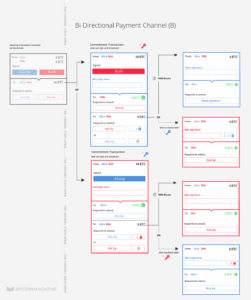You must login to view your message.
some code
Starting up the Lightning Daemon
/*~ Welcome, wonderful reader!
*
* This is the core of c-lightning: the main file of the master daemon
* `lightningd`. It's mainly cluttered with the miscellany of setup,
* and a few startup sanity checks.
*
* The role of this daemon is to start the subdaemons, shuffle peers
* between them, handle the JSON RPC requests, bitcoind, the database
* and centralize logging. In theory, it doesn't trust the other
* daemons, though we expect `hsmd` (which holds secret keys) to be
* responsive.
*
* Comments beginning with a ~ (like this one!) are part of our shared
* adventure through the source, so they're more meta than normal code
* comments, and meant to be read in a certain order.
*/
/*~ Notice how includes are in ASCII order: this is actually enforced by
* the build system under `make check-source`. It avoids merge conflicts
* and keeps things consistent. */
#include "gossip_control.h"
#include "hsm_control.h"
#include "lightningd.h"
#include "peer_control.h"
#include "subd.h"
/*~ This is Ian Lance Taylor's libbacktrace. It turns out that it's
* horrifically difficult to obtain a decent backtrace in C; the standard
* backtrace function is useless in most programs. */
#include <backtrace.h>
/*~ These headers are from CCAN: http://ccodearchive.net.
*
* It's another one of Rusty's projects, and we copy and paste it
* automatically into the source tree here, so you should never edit
* it. There's a Makefile target update-ccan to update it (and add modules
* if CCAN_NEW is specified).
*
* The most used of these are `ccan/tal` and `ccan/take`, which we'll describe
* in detail below.
*/
#include <ccan/array_size/array_size.h>
#include <ccan/cast/cast.h>
#include <ccan/crypto/hkdf_sha256/hkdf_sha256.h>
#include <ccan/err/err.h>
#include <ccan/io/fdpass/fdpass.h>
#include <ccan/io/io.h>
#include <ccan/json_escape/json_escape.h>
#include <ccan/noerr/noerr.h>
#include <ccan/pipecmd/pipecmd.h>
#include <ccan/read_write_all/read_write_all.h>
#include <ccan/take/take.h>
#include <ccan/tal/grab_file/grab_file.h>
#include <ccan/tal/path/path.h>
#include <ccan/tal/str/str.h>
/*~ This is common code: routines shared by one or more executables
* (separate daemons, or the lightning-cli program). */
#include <common/daemon.h>
#include <common/ecdh_hsmd.h>
#include <common/features.h>
#include <common/memleak.h>
#include <common/timeout.h>
#include <common/utils.h>
#include <common/version.h>
#include <errno.h>
#include <fcntl.h>
#include <gen_header_versions.h>
#include <lightningd/bitcoind.h>
#include <lightningd/chaintopology.h>
#include <lightningd/channel_control.h>
#include <lightningd/coin_mvts.h>
#include <lightningd/connect_control.h>
#include <lightningd/invoice.h>
#include <lightningd/io_loop_with_timers.h>
#include <lightningd/jsonrpc.h>
#include <lightningd/log.h>
#include <lightningd/memdump.h>
#include <lightningd/onchain_control.h>
#include <lightningd/options.h>
#include <signal.h>
#include <sodium.h>
#include <sys/resource.h>
#include <sys/types.h>
#include <unistd.h>
static void destroy_alt_subdaemons(struct lightningd *ld);
#if DEVELOPER
static void memleak_help_alt_subdaemons(struct htable *memtable,
struct lightningd *ld);
#endif /* DEVELOPER */
/*~ The core lightning object: it's passed everywhere, and is basically a
* global variable. This new_xxx pattern is something we'll see often:
* it allocates and initializes a new structure, using *tal*, the hierarchical
* allocator. */
static struct lightningd *new_lightningd(const tal_t *ctx)
{
/*~ tal: each allocation is a child of an existing object (or NULL,
* the top-level object). When an object is freed, all the objects
* `tallocated` off it are also freed. We use it in place of malloc
* and free. For the technically inclined: tal allocations usually
* build a tree, and tal_freeing any node in the tree will result in
* the entire subtree rooted at that node to be freed.
*
* It's incredibly useful for grouping object lifetimes, as we'll see.
* For example, a `struct lightningd` has a pointer to a `log_book`
* which is allocated off the `struct lightningd`, and has its own
* internal members allocated off `log_book`: freeing `struct
* lightningd` frees them all.
*
* In this case, freeing `ctx` will free `ld`:
*/
struct lightningd *ld = tal(ctx, struct lightningd);
/*~ Style note: `ctx` is declared `const`, yet we can `tallocate` from
* it. Adding/removing children is not considered to change an
* object; nor, in fact, is freeing it with tal_free(). This allows
* us to use const more liberally: the style rule here is that you
* should use 'const' on pointers if you can. */
/*~ Note that we generally EXPLICITLY #if-wrap DEVELOPER code. This
* is a nod to keeping it minimal and explicit: we need this code for
* testing, but its existence means we're not actually testing the
* same exact code users will be running. */
#if DEVELOPER
ld->dev_debug_subprocess = NULL;
ld->dev_disconnect_fd = -1;
ld->dev_subdaemon_fail = false;
ld->dev_allow_localhost = false;
ld->dev_gossip_time = 0;
ld->dev_fast_gossip = false;
ld->dev_fast_gossip_prune = false;
ld->dev_force_privkey = NULL;
ld->dev_force_bip32_seed = NULL;
ld->dev_force_channel_secrets = NULL;
ld->dev_force_channel_secrets_shaseed = NULL;
ld->dev_force_tmp_channel_id = NULL;
ld->dev_no_htlc_timeout = false;
ld->dev_no_version_checks = false;
#endif
/*~ These are CCAN lists: an embedded double-linked list. It's not
* really typesafe, but relies on convention to access the contents.
* It's inspired by the closely-related Linux kernel list.h.
*
* You declare them as a `struct list_head` (or use the LIST_HEAD()
* macro which doesn't work on dynamically-allocated objects like `ld`
* here). The item which will go into the list must declared a
* `struct list_node` for each list it can be in.
*
* The most common operations are list_head_init(), list_add(),
* list_del() and list_for_each().
*
* This method of manually declaring the list hooks avoids dynamic
* allocations to put things into a list. */
list_head_init(&ld->peers);
/*~ These are hash tables of incoming and outgoing HTLCs (contracts),
* defined as `struct htlc_in` and `struct htlc_out` in htlc_end.h.
* The hash tables are declared there using the very ugly
* HTABLE_DEFINE_TYPE macro. The key is the channel the HTLC is in
* and the 64-bit htlc-id which is unique for that channel and
* direction. That htlc-id is used in the inter-peer wire protocol,
* so it is the logical key.
*
* There aren't usually many HTLCs, so we could have just used a linked
* list attached to the channel structure itself, or even left them in
* the database rather than making an in-memory version. Obviously
* I was in a premature optimization mood when I wrote this: */
htlc_in_map_init(&ld->htlcs_in);
htlc_out_map_init(&ld->htlcs_out);
/*~ For multi-part payments, we need to keep some incoming payments
* in limbo until we get all the parts, or we time them out. */
htlc_set_map_init(&ld->htlc_sets);
/*~ We have a multi-entry log-book infrastructure: we define a 100MB log
* book to hold all the entries (and trims as necessary), and multiple
* log objects which each can write into it, each with a unique
* prefix. */
ld->log_book = new_log_book(ld, 100*1024*1024);
/*~ Note the tal context arg (by convention, the first argument to any
* allocation function): ld->log will be implicitly freed when ld
* is. */
ld->log = new_log(ld, ld->log_book, NULL, "lightningd");
ld->logfile = NULL;
/*~ We explicitly set these to NULL: if they're still NULL after option
* parsing, we know they're to be set to the defaults. */
ld->alias = NULL;
ld->rgb = NULL;
list_head_init(&ld->connects);
list_head_init(&ld->waitsendpay_commands);
list_head_init(&ld->sendpay_commands);
list_head_init(&ld->close_commands);
list_head_init(&ld->ping_commands);
list_head_init(&ld->waitblockheight_commands);
/*~ Tal also explicitly supports arrays: it stores the number of
* elements, which can be accessed with tal_count() (or tal_bytelen()
* for raw bytecount). It's common for simple arrays to use
* tal_resize() (or tal_arr_expand) to expand, which does not work on
* NULL. So we start with an zero-length array. */
ld->proposed_wireaddr = tal_arr(ld, struct wireaddr_internal, 0);
ld->proposed_listen_announce = tal_arr(ld, enum addr_listen_announce, 0);
ld->portnum = DEFAULT_PORT;
ld->listen = true;
ld->autolisten = true;
ld->reconnect = true;
/*~ This is from ccan/timer: it is efficient for the case where timers
* are deleted before expiry (as is common with timeouts) using an
* ingenious bucket system which more precisely sorts timers as they
* approach expiry. It's a fascinating implementation you should read
* if you have a spare few hours. */
ld->timers = tal(ld, struct timers);
timers_init(ld->timers, time_mono());
/*~ This is detailed in chaintopology.c */
ld->topology = new_topology(ld, ld->log);
ld->daemon_parent_fd = -1;
ld->proxyaddr = NULL;
ld->use_proxy_always = false;
ld->pure_tor_setup = false;
ld->tor_service_password = NULL;
ld->max_funding_unconfirmed = 2016;
/*~ This is initialized later, but the plugin loop examines this,
* so set it to NULL explicitly now. */
ld->wallet = NULL;
/*~ In the next step we will initialize the plugins. This will
* also populate the JSON-RPC with passthrough methods, hence
* lightningd needs to have something to put those in. This
* is that :-)
*/
jsonrpc_setup(ld);
/*~ We changed when we start plugins, messing up relative paths.
* This saves our original dirs so we can fixup and warn for the
* moment (0.7.2). */
ld->original_directory = path_cwd(ld);
/*~ We run a number of plugins (subprocesses that we talk JSON-RPC with)
* alongside this process. This allows us to have an easy way for users
* to add their own tools without having to modify the c-lightning source
* code. Here we initialize the context that will keep track and control
* the plugins.
*/
ld->plugins = plugins_new(ld, ld->log_book, ld);
ld->plugins->startup = true;
/*~ This is set when a JSON RPC command comes in to shut us down. */
ld->stop_conn = NULL;
/*~ This is used to signal that `hsm_secret` is encrypted, and will
* be set to `true` if the `--encrypted-hsm` option is passed at startup.
*/
ld->encrypted_hsm = false;
/* This is used to override subdaemons */
strmap_init(&ld->alt_subdaemons);
tal_add_destructor(ld, destroy_alt_subdaemons);
memleak_add_helper(ld, memleak_help_alt_subdaemons);
/*~ We change umask if we daemonize, but not if we don't. Initialize the
* initial_umask anyway as we might rely on it later (`plugin start`). */
ld->initial_umask = umask(0);
umask(ld->initial_umask);
/*~ This is the mode of the created JSON-RPC socket file, in
* traditional Unix octal. 0600 means only the user that ran
* lightningd can invoke RPC on it. Changing it to 0660 may
* be sensible if you run lightningd in its own system user,
* and just let specific users (add the group of the
* lightningd runner as an ancillary group) access its
* RPC. Can be overridden with `--rpc-file-mode`.
*/
ld->rpc_filemode = 0600;
/*~ This is the exit code to use on exit.
* Set to NULL meaning we are not interested in exiting yet.
*/
ld->exit_code = NULL;
/*~ We maintain a round-robin list of channels.
* This round-robin list of channels is used to ensure that
* each invoice we generate has a different set of channels. */
list_head_init(&ld->rr_channels);
return ld;
}
/*~ We list our daemons here so on startup we can test they're the
* correct versions and that they exist. */
static const char *subdaemons[] = {
"lightning_channeld",
"lightning_closingd",
"lightning_connectd",
"lightning_gossipd",
"lightning_hsmd",
"lightning_onchaind",
"lightning_openingd"
};
/* Return true if called with a recognized subdaemon e.g. "hsmd" */
bool is_subdaemon(const char *sdname)
{
for (size_t i = 0; i < ARRAY_SIZE(subdaemons); i++)
/* Skip the "lightning_" prefix in the table */
if (streq(sdname, subdaemons[i] + strlen("lightning_")))
return true;
return false;
}
static void destroy_alt_subdaemons(struct lightningd *ld)
{
strmap_clear(&ld->alt_subdaemons);
}
#if DEVELOPER
static void memleak_help_alt_subdaemons(struct htable *memtable,
struct lightningd *ld)
{
memleak_remove_strmap(memtable, &ld->alt_subdaemons);
}
#endif /* DEVELOPER */
const char *subdaemon_path(const tal_t *ctx, const struct lightningd *ld, const char *name)
{
/* Strip the leading "lightning_" before looking in alt_subdaemons.
*/
size_t pfxlen = strlen("lightning_");
assert(strlen(name) > pfxlen);
const char *short_name = tal_strdup(ctx, name + pfxlen);
/* Is there an alternate path for this subdaemon? */
const char *dpath;
const char *alt = strmap_get(&ld->alt_subdaemons, short_name);
if (alt) {
/* path_join will honor absolute paths as well. */
dpath = path_join(ctx, ld->daemon_dir, alt);
} else {
/* This subdaemon is found in the standard place. */
dpath = path_join(ctx, ld->daemon_dir, name);
}
return dpath;
}
/*~ Check we can run them, and check their versions */
void test_subdaemons(const struct lightningd *ld)
{
size_t i;
/*~ CCAN's ARRAY_SIZE() should always be used on defined arrays like
* the subdaemons array above. You can calculate the number of
* elements it has using `sizeof(subdaemons)/sizeof(subdaemons[0])`
* but if `subdaemons` were refactored into a pointer (eg. to make
* it a dynamic array) that would erroneously evaluate to `1`.
*
* ARRAY_SIZE will cause a compiler error if the argument is actually
* a pointer, not an array. */
for (i = 0; i < ARRAY_SIZE(subdaemons); i++) {
/*~ CCAN's path module uses tal, so wants a context to
* allocate from. We have a magic convenience context
* `tmpctx` for temporary allocations like this.
*
* Because all our daemons at their core are of form `while
* (!stopped) handle_events();` (an event loop pattern), we
* can free `tmpctx` in that top-level loop after each event
* is handled.
*/
int outfd;
const char *dpath = subdaemon_path(tmpctx, ld, subdaemons[i]);
const char *verstring;
/*~ CCAN's pipecmd module is like popen for grownups: it
* takes pointers to fill in stdin, stdout and stderr file
* descriptors if desired, and the remainder of arguments
* are the command and its argument. */
pid_t pid = pipecmd(NULL, &outfd, &outfd,
dpath, "--version", NULL);
/*~ Our logging system: spam goes in at log_debug level, but
* logging is mainly added by developer necessity and removed
* by developer/user complaints . The only strong convention
* is that log_broken() is used for "should never happen".
*
* Note, however, that logging takes care to preserve the
* global `errno` which is set above. */
log_debug(ld->log, "testing %s", dpath);
/*~ ccan/err is a wrapper around BSD's err.h, which defines
* the convenience functions err() (error with message
* followed by a string based on errno) and errx() (same,
* but no errno string). */
if (pid == -1)
err(1, "Could not run %s", dpath);
/*~ CCAN's grab_file module contains a routine to read into a
* tallocated buffer until EOF */
verstring = grab_fd(tmpctx, outfd);
/*~ Like many CCAN modules, it set errno on failure, which
* err (ccan/err, but usually just the BSD <err.h>) prints */
if (!verstring)
err(1, "Could not get output from %s", dpath);
/*~ strstarts is from CCAN/str. */
if (!strstarts(verstring, version())
|| verstring[strlen(version())] != '\n')
errx(1, "%s: bad version '%s'",
subdaemons[i], verstring);
/*~ finally reap the child process, freeing all OS
* resources that go with it */
waitpid(pid, NULL, 0);
}
}
/* Check if all subdaemons exist in specified directory. */
static bool has_all_subdaemons(const char *daemon_dir)
{
size_t i;
bool missing_daemon = false;
for (i = 0; i < ARRAY_SIZE(subdaemons); ++i) {
if (!path_is_file(path_join(tmpctx, daemon_dir, subdaemons[i]))) {
missing_daemon = true;
break;
}
}
return !missing_daemon;
}
/* Returns the directory this executable is running from */
static const char *find_my_directory(const tal_t *ctx, const char *argv0)
{
/* find_my_abspath simply exits on failure, so never returns NULL. */
const char *me = find_my_abspath(NULL, argv0);
/*~ The caller just wants the directory we're in.
*
* Note the magic `take()` macro here: it annotates a pointer as "to
* be taken", and the recipient is expected to take ownership of the
* pointer. This improves efficiency because the recipient might
* choose to use or even keep it rather than make a copy (or it
* might just free it).
*
* Many CCAN and our own routines support this, but if you hand a
* `take()` to a routine which *doesn't* expect it, unfortunately you
* don't get a compile error (we have runtime detection for this
* case, however).
*/
return path_dirname(ctx, take(me));
}
/*~ This returns the PKGLIBEXEC path which is where binaries get installed.
* Note the `TAKES` annotation which indicates that the `my_path` parameter
* can be take(); in which case, this function will handle freeing it.
*
* TAKES is only a convention unfortunately, and ignored by the compiler.
*/
static const char *find_my_pkglibexec_path(struct lightningd *ld,
const char *my_path TAKES)
{
const char *pkglibexecdir;
/*~`path_join` is declared in ccan/path/path.h as:
*
* char *path_join(const tal_t *ctx,
* const char *base TAKES, const char *a TAKES);
*
* So, as we promised with 'TAKES' in our own declaration, if the
* caller has called `take()` the `my_path` parameter, path_join()
* will free it. */
pkglibexecdir = path_join(NULL, my_path, BINTOPKGLIBEXECDIR);
/*~ The plugin dir is in ../libexec/c-lightning/plugins, which (unlike
* those given on the command line) does not need to exist. */
plugins_set_builtin_plugins_dir(ld->plugins,
path_join(tmpctx,
pkglibexecdir, "plugins"));
/*~ Sometimes take() can be more efficient, since the routine can
* manipulate the string in place. This is the case here. */
return path_simplify(ld, take(pkglibexecdir));
}
/* Determine the correct daemon dir. */
static const char *find_daemon_dir(struct lightningd *ld, const char *argv0)
{
const char *my_path = find_my_directory(ld, argv0);
/* If we're running in-tree, all the subdaemons are with lightningd. */
if (has_all_subdaemons(my_path)) {
/* In this case, look for built-in plugins in ../plugins */
plugins_set_builtin_plugins_dir(ld->plugins,
path_join(tmpctx,
my_path,
"../plugins"));
return my_path;
}
/* Otherwise we assume they're in the installed dir. */
return find_my_pkglibexec_path(ld, take(my_path));
}
/*~ We like to free everything on exit, so valgrind doesn't complain (valgrind
* is an awesome runtime memory usage detector for C and C++ programs). In
* some ways it would be neater not to do this, but it turns out some
* transient objects still need cleaning. */
static void shutdown_subdaemons(struct lightningd *ld)
{
struct peer *p;
/*~ tal supports *destructors* using `tal_add_destructor()`; the most
* common use is for an object to delete itself from a linked list
* when it's freed.
*
* As a result, freeing an object (which frees any tal objects
* allocated off it, and any allocated off them, etc) may cause
* callbacks; in this case, some objects freed here can cause database
* writes, which must be inside a transaction. */
db_begin_transaction(ld->wallet->db);
/* Let everyone shutdown cleanly. */
close(ld->hsm_fd);
/*~ The three "global" daemons, which we shutdown explicitly: we
* give them 10 seconds to exit gracefully before killing them. */
ld->connectd = subd_shutdown(ld->connectd, 10);
/* Now we free all the HTLCs */
free_htlcs(ld, NULL);
/*~ For every peer, we free every channel. On allocation the peer was
* given a destructor (`destroy_peer`) which removes itself from the
* list. Thus we use list_top() not list_pop() here. */
while ((p = list_top(&ld->peers, struct peer, list)) != NULL) {
struct channel *c;
/*~ A peer can have multiple channels; we only allow one to be
* open at any time, but we remember old ones for 100 blocks,
* after all the outputs we care about are spent. */
while ((c = list_top(&p->channels, struct channel, list))
!= NULL) {
/* Removes itself from list as we free it */
tal_free(c);
}
/* A peer may have a channel in the process of opening. */
if (p->uncommitted_channel) {
struct uncommitted_channel *uc = p->uncommitted_channel;
/* Setting to NULL stops destroy_uncommitted_channel
* from trying to remove peer from db! */
p->uncommitted_channel = NULL;
tal_free(uc);
}
/* Removes itself from list as we free it */
tal_free(p);
}
/*~ Now they're all dead, we can stop gossipd: doing it before HTLCs is
* problematic because local_fail_in_htlc_needs_update() asks gossipd */
ld->gossip = subd_shutdown(ld->gossip, 10);
ld->hsm = subd_shutdown(ld->hsm, 10);
/*~ Commit the transaction. Note that the db is actually
* single-threaded, so commits never fail and we don't need
* spin-and-retry logic everywhere. */
db_commit_transaction(ld->wallet->db);
}
/*~ Our wallet logic needs to know what outputs we might be interested in. We
* use BIP32 (a.k.a. "HD wallet") to generate keys from a single seed, so we
* keep the maximum-ever-used key index in the db, and add them all to the
* filter here. */
static void init_txfilter(struct wallet *w, struct txfilter *filter)
{
/*~ This is defined in libwally, so we didn't have to reimplement */
struct ext_key ext;
/*~ Note the use of ccan/short_types u64 rather than uint64_t.
* Thank me later. */
u64 bip32_max_index;
bip32_max_index = db_get_intvar(w->db, "bip32_max_index", 0);
/*~ One of the C99 things I unequivocally approve: for-loop scope. */
for (u64 i = 0; i <= bip32_max_index + w->keyscan_gap; i++) {
if (bip32_key_from_parent(w->bip32_base, i, BIP32_FLAG_KEY_PUBLIC, &ext) != WALLY_OK) {
abort();
}
txfilter_add_derkey(filter, ext.pub_key);
}
}
/*~ The normal advice for daemons is to move into the root directory, so you
* don't prevent unmounting whatever filesystem you happen to start in.
*
* But we define every path relative to our (~/.lightning) data dir, so we
* make sure we stay there. The rest of this is taken from ccan/daemonize,
* which was based on W. Richard Steven's advice in Programming in The Unix
* Environment.
*/
static void complete_daemonize(struct lightningd *ld)
{
int ok_status = 0;
/* Don't hold files open. */
close(STDIN_FILENO);
close(STDOUT_FILENO);
close(STDERR_FILENO);
/* Many routines write to stderr; that can cause chaos if used
* for something else, so set it here. */
if (open("/dev/null", O_WRONLY) != 0)
fatal("Could not open /dev/null: %s", strerror(errno));
if (dup2(0, STDERR_FILENO) != STDERR_FILENO)
fatal("Could not dup /dev/null for stderr: %s", strerror(errno));
close(0);
/* Session leader so ^C doesn't whack us. */
if (setsid() == (pid_t)-1)
fatal("Could not setsid: %s", strerror(errno));
/* Discard our parent's old-fashioned umask prejudices. */
ld->initial_umask = umask(0);
/* OK, parent, you can exit(0) now. */
write_all(ld->daemon_parent_fd, &ok_status, sizeof(ok_status));
close(ld->daemon_parent_fd);
}
/*~ It's pretty standard behaviour (especially for daemons) to create and
* file-lock a pidfile. This not only prevents accidentally running multiple
* daemons on the same database at once, but lets nosy sysadmins see what pid
* the currently-running daemon is supposed to be. */
static void pidfile_create(const struct lightningd *ld)
{
int pid_fd;
char *pid;
/* Create PID file: relative to .config dir. */
pid_fd = open(ld->pidfile, O_WRONLY|O_CREAT, 0640);
if (pid_fd < 0)
err(1, "Failed to open PID file");
/* Lock PID file, so future lockf will fail. */
if (lockf(pid_fd, F_TLOCK, 0) < 0)
/* Problem locking file */
err(1, "lightningd already running? Error locking PID file");
/*~ As closing the file will remove the lock, we need to keep it open;
* the OS will close it implicitly when we exit for any reason. */
/*~ Note that tal_fmt() is what asprintf() dreams of being. */
pid = tal_fmt(tmpctx, "%d\n", getpid());
/*~ CCAN's write_all writes to a file descriptor, looping if necessary
* (which, on a file unlike a socket, is never, for historical UNIX
* reasons). It also isn't declared with GCC's warn_unused_result
* which write() is when FORTIFY_SOURCE is defined, so we're allowed
* to ignore the result without jumping through hoops. */
write_all(pid_fd, pid, strlen(pid));
}
/*~ ccan/io allows overriding the poll() function that is the very core
* of the event loop it runs for us. We override it so that we can do
* extra sanity checks, and it's also a good point to free the tmpctx. */
static int io_poll_lightningd(struct pollfd *fds, nfds_t nfds, int timeout)
{
/* These checks and freeing tmpctx are common to all daemons. */
return daemon_poll(fds, nfds, timeout);
}
/*~ Ever had one of those functions which doesn't quite fit anywhere? Me too.
* Implementing a generic notifier framework is overkill in a static codebase
* like this, and it's always better to have compile-time calls than runtime,
* as it makes the code more explicit. But pasting in direct calls is also an
* abstraction violation, so we use this middleman function. */
void notify_new_block(struct lightningd *ld, u32 block_height)
{
/* Inform our subcomponents individually. */
htlcs_notify_new_block(ld, block_height);
channel_notify_new_block(ld, block_height);
gossip_notify_new_block(ld, block_height);
waitblockheight_notify_new_block(ld, block_height);
}
static void on_sigint(int _ UNUSED)
{
static const char *msg = "lightningd: SIGINT caught, exiting.\n";
write_all(STDERR_FILENO, msg, strlen(msg));
_exit(1);
}
static void on_sigterm(int _ UNUSED)
{
static const char *msg = "lightningd: SIGTERM caught, exiting.\n";
write_all(STDERR_FILENO, msg, strlen(msg));
_exit(1);
}
/*~ We only need to handle SIGTERM and SIGINT for the case we are PID 1 of
* docker container since Linux makes special this PID and requires that
* some handler exist. */
static void setup_sig_handlers(void)
{
struct sigaction sigint, sigterm;
memset(&sigint, 0, sizeof(struct sigaction));
memset(&sigterm, 0, sizeof(struct sigaction));
sigint.sa_handler = on_sigint;
sigterm.sa_handler = on_sigterm;
if (1 == getpid()) {
sigaction(SIGINT, &sigint, NULL);
sigaction(SIGTERM, &sigterm, NULL);
}
}
/*~ We actually keep more than one set of features, used in different
* contexts. common/features.c knows how each standard feature is
* presented, so we have it generate the set for each one at a time, and
* combine them.
*
* This is inefficient, but the primitives are useful for adding single
* features later, or adding them when supplied by plugins. */
static struct feature_set *default_features(const tal_t *ctx)
{
struct feature_set *ret = NULL;
static const u32 features[] = {
OPTIONAL_FEATURE(OPT_DATA_LOSS_PROTECT),
OPTIONAL_FEATURE(OPT_UPFRONT_SHUTDOWN_SCRIPT),
OPTIONAL_FEATURE(OPT_GOSSIP_QUERIES),
OPTIONAL_FEATURE(OPT_VAR_ONION),
OPTIONAL_FEATURE(OPT_PAYMENT_SECRET),
OPTIONAL_FEATURE(OPT_BASIC_MPP),
OPTIONAL_FEATURE(OPT_GOSSIP_QUERIES_EX),
OPTIONAL_FEATURE(OPT_STATIC_REMOTEKEY),
#if EXPERIMENTAL_FEATURES
OPTIONAL_FEATURE(OPT_ANCHOR_OUTPUTS),
OPTIONAL_FEATURE(OPT_ONION_MESSAGES),
#endif
};
for (size_t i = 0; i < ARRAY_SIZE(features); i++) {
struct feature_set *f
= feature_set_for_feature(NULL, features[i]);
if (!ret)
ret = tal_steal(ctx, f);
else
feature_set_or(ret, take(f));
}
return ret;
}
/*~ We need this function style to hand to ecdh_hsmd_setup, but it's just a thin
* wrapper around fatal() */
static void hsm_ecdh_failed(enum status_failreason fail,
const char *fmt, ...)
{
fatal("hsm failure: %s", fmt);
}
/*~ This signals to the mainloop that some part wants to cleanly exit now. */
void lightningd_exit(struct lightningd *ld, int exit_code)
{
ld->exit_code = tal(ld, int);
*ld->exit_code = exit_code;
io_break(ld);
}
int main(int argc, char *argv[])
{
struct lightningd *ld;
u32 min_blockheight, max_blockheight;
int connectd_gossipd_fd;
int stop_fd;
struct timers *timers;
const char *stop_response;
struct htlc_in_map *unconnected_htlcs_in;
struct ext_key *bip32_base;
struct rlimit nofile = {1024, 1024};
int exit_code = 0;
/*~ Make sure that we limit ourselves to something reasonable. Modesty
* is a virtue. */
setrlimit(RLIMIT_NOFILE, &nofile);
/*~ What happens in strange locales should stay there. */
setup_locale();
setup_sig_handlers();
/*~ This checks that the system-installed libraries (usually
* dynamically linked) actually are compatible with the ones we
* compiled with.
*
* The header itself is auto-generated every time the version of the
* installed libraries changes, as we had an sqlite3 version update
* which broke people, and "make" didn't think there was any work to
* do, so rebuilding didn't fix it. */
check_linked_library_versions();
/*~ Every daemon calls this in some form: the hooks are for dumping
* backtraces when we crash (if supported on this platform). */
daemon_setup(argv[0], log_backtrace_print, log_backtrace_exit);
/*~ There's always a battle between what a constructor like this
* should do, and what should be added later by the caller. In
* general, because we use valgrind heavily for testing, we prefer not
* to initialize unused fields which we expect the caller to set:
* valgrind will warn us if we make decisions based on uninitialized
* variables. */
ld = new_lightningd(NULL);
ld->state = LD_STATE_RUNNING;
/* Figure out where our daemons are first. */
ld->daemon_dir = find_daemon_dir(ld, argv[0]);
if (!ld->daemon_dir)
errx(1, "Could not find daemons");
/* Set up the feature bits for what we support */
ld->our_features = default_features(ld);
/*~ Handle early options; this moves us into --lightning-dir.
* Plugins may add new options, which is why we are splitting
* between early args (including --plugin registration) and
* non-early opts. This also forks if they say --daemon. */
handle_early_opts(ld, argc, argv);
/*~ Initialize all the plugins we just registered, so they can
* do their thing and tell us about themselves (including
* options registration). */
plugins_init(ld->plugins);
/*~ Handle options and config. */
handle_opts(ld, argc, argv);
/*~ Now create the PID file: this errors out if there's already a
* daemon running, so we call before doing almost anything else. */
pidfile_create(ld);
/*~ Make sure we can reach the subdaemons, and versions match.
* This can be turned off in DEVELOPER builds with --dev-skip-version-checks,
* but the `dev_no_version_checks` field of `ld` doesn't even exist
* if DEVELOPER isn't defined, so we use IFDEV(devoption,non-devoption):
*/
if (IFDEV(!ld->dev_no_version_checks, 1))
test_subdaemons(ld);
/*~ Set up the HSM daemon, which knows our node secret key, so tells
* us who we are.
*
* HSM stands for Hardware Security Module, which is the industry
* standard of key storage; ours is in software for now, so the name
* doesn't really make sense, but we can't call it the Badly-named
* Daemon Software Module. */
bip32_base = hsm_init(ld);
/*~ Our "wallet" code really wraps the db, which is more than a simple
* bitcoin wallet (though it's that too). It also stores channel
* states, invoices, payments, blocks and bitcoin transactions. */
ld->wallet = wallet_new(ld, ld->timers, bip32_base);
/*~ We keep track of how many 'coin moves' we've ever made.
* Initialize the starting value from the database here. */
coin_mvts_init_count(ld);
/*~ We keep a filter of scriptpubkeys we're interested in. */
ld->owned_txfilter = txfilter_new(ld);
/*~ This is the ccan/io central poll override from above. */
io_poll_override(io_poll_lightningd);
/*~ If hsm_secret is encrypted, we don't need its encryption key
* anymore. Note that sodium_munlock() also zeroes the memory.*/
if (ld->config.keypass)
sodium_munlock(ld->config.keypass->data, sizeof(ld->config.keypass->data));
/*~ Our default color and alias are derived from our node id, so we
* can only set those now (if not set by config options). */
setup_color_and_alias(ld);
/*~ Set up connect daemon: this manages receiving and making
* TCP connections. It needs to talk to the gossip daemon
* which knows (via node_announcement messages) the public
* addresses of nodes, so connectd_init hands it one end of a
* socket pair, and gives us the other */
connectd_gossipd_fd = connectd_init(ld);
/*~ The gossip daemon looks after the routing gossip;
* channel_announcement, channel_update, node_announcement and gossip
* queries. */
gossip_init(ld, connectd_gossipd_fd);
/*~ We do every database operation within a transaction; usually this
* is covered by the infrastructure (eg. opening a transaction before
* handling a message or expiring a timer), but for startup we do this
* explicitly. */
db_begin_transaction(ld->wallet->db);
/*~ Our default names, eg. for the database file, are not dependent on
* the network. Instead, the db knows what chain it belongs to, and we
* simple barf here if it's wrong. */
if (!wallet_network_check(ld->wallet))
errx(1, "Wallet network check failed.");
/*~ Initialize the transaction filter with our pubkeys. */
init_txfilter(ld->wallet, ld->owned_txfilter);
/*~ Get the blockheight we are currently at, UINT32_MAX is used to signal
* an uninitialized wallet and that we should start off of bitcoind's
* current height */
wallet_blocks_heights(ld->wallet, UINT32_MAX,
&min_blockheight, &max_blockheight);
/*~ If we were asked to rescan from an absolute height (--rescan < 0)
* then just go there. Otherwise compute the diff to our current height,
* lowerbounded by 0. */
if (ld->config.rescan < 0)
max_blockheight = -ld->config.rescan;
else if (max_blockheight < (u32)ld->config.rescan)
max_blockheight = 0;
else if (max_blockheight != UINT32_MAX)
max_blockheight -= ld->config.rescan;
/*~ That's all of the wallet db operations for now. */
db_commit_transaction(ld->wallet->db);
/*~ Initialize block topology. This does its own io_loop to
* talk to bitcoind, so does its own db transactions. */
setup_topology(ld->topology, ld->timers,
min_blockheight, max_blockheight);
db_begin_transaction(ld->wallet->db);
/*~ Tell the wallet to start figuring out what to do for any reserved
* unspent outputs we may have crashed with. */
wallet_clean_utxos(ld->wallet, ld->topology->bitcoind);
/*~ Pull peers, channels and HTLCs from db. Needs to happen after the
* topology is initialized since some decisions rely on being able to
* know the blockheight. */
unconnected_htlcs_in = load_channels_from_wallet(ld);
db_commit_transaction(ld->wallet->db);
/*~ Create RPC socket: now lightning-cli can send us JSON RPC commands
* over a UNIX domain socket specified by `ld->rpc_filename`. */
jsonrpc_listen(ld->jsonrpc, ld);
/*~ Now that the rpc path exists, we can start the plugins and they
* can start talking to us. */
plugins_config(ld->plugins);
/*~ Process any HTLCs we were in the middle of when we exited, now
* that plugins (who might want to know via htlc_accepted hook) are
* active. These will immediately fail, since no peers are connected,
* however partial payments may still be absorbed into htlc_set. */
db_begin_transaction(ld->wallet->db);
htlcs_resubmit(ld, unconnected_htlcs_in);
db_commit_transaction(ld->wallet->db);
/*~ Activate connect daemon. Needs to be after the initialization of
* chaintopology, otherwise peers may connect and ask for
* uninitialized data. */
connectd_activate(ld);
/*~ "onchaind" is a dumb daemon which tries to get our funds back: it
* doesn't handle reorganizations, but it's idempotent, so we can
* simply just restart it if the chain moves. Similarly, we replay it
* chain events from the database on restart, beginning with the
* "funding transaction spent" event which creates it. */
onchaind_replay_channels(ld);
/*~ Mark ourselves live.
*
* Note the use of type_to_string() here: it's a typesafe formatter,
* often handed 'tmpctx' like here to allocate a throwaway string for
* formatting. json_escape() avoids printing weird characters in our
* log. And tal_hex() is a helper from utils which returns a hex string;
* it's assumed that the argument was allocated with tal or tal_arr
* so it can use tal_bytelen() to get the length. */
log_info(ld->log, "--------------------------------------------------");
log_info(ld->log, "Server started with public key %s, alias %s (color #%s) and lightningd %s",
type_to_string(tmpctx, struct node_id, &ld->id),
json_escape(tmpctx, (const char *)ld->alias)->s,
tal_hex(tmpctx, ld->rgb), version());
/*~ This is where we ask connectd to reconnect to any peers who have
* live channels with us, and makes sure we're watching the funding
* tx. */
activate_peers(ld);
/*~ Now that all the notifications for transactions are in place, we
* can start the poll loop which queries bitcoind for new blocks. */
begin_topology(ld->topology);
/*~ To handle --daemon, we fork the daemon early (otherwise we hit
* issues with our pid changing), but keep the parent around until
* we've completed most initialization: that way we'll exit with an
* error rather than silently exiting 0, then realizing we can't start
* and forcing the confused user to read the logs.
*
* But we're all initialized, so detach and have parent exit now. */
if (ld->daemon_parent_fd != -1)
complete_daemonize(ld);
/*~ Setting this (global) activates the crash log: we don't usually need
* a backtrace if we fail during startup. */
crashlog = ld->log;
/*~ This sets up the ecdh() function in ecdh_hsmd to talk to hsmd */
ecdh_hsmd_setup(ld->hsm_fd, hsm_ecdh_failed);
/*~ The root of every backtrace (almost). This is our main event
* loop. */
void *io_loop_ret = io_loop_with_timers(ld);
/*~ io_loop_with_timers will only exit if we call io_break.
* At this point in code, we should use io_break(ld) to
* shut down.
*/
assert(io_loop_ret == ld);
ld->state = LD_STATE_SHUTDOWN;
/* Were we exited via `lightningd_exit`? */
if (ld->exit_code) {
exit_code = *ld->exit_code;
stop_fd = -1;
stop_response = NULL;
} else {
/* Keep this fd around, to write final response at the end. */
stop_fd = io_conn_fd(ld->stop_conn);
io_close_taken_fd(ld->stop_conn);
stop_response = tal_steal(NULL, ld->stop_response);
}
shutdown_subdaemons(ld);
/* Remove plugins. */
plugins_free(ld->plugins);
/* Clean up the JSON-RPC. This needs to happen in a DB transaction since
* it might actually be touching the DB in some destructors, e.g.,
* unreserving UTXOs (see #1737) */
db_begin_transaction(ld->wallet->db);
tal_free(ld->jsonrpc);
free_unreleased_txs(ld->wallet);
db_commit_transaction(ld->wallet->db);
/* Clean our our HTLC maps, since they use malloc. */
htlc_in_map_clear(&ld->htlcs_in);
htlc_out_map_clear(&ld->htlcs_out);
remove(ld->pidfile);
/* FIXME: pay can have children off tmpctx which unlink from
* ld->payments, so clean that up. */
clean_tmpctx();
/* Free this last: other things may clean up timers. */
timers = tal_steal(NULL, ld->timers);
tal_free(ld);
timers_cleanup(timers);
tal_free(timers);
opt_free_table();
daemon_shutdown();
/* Finally, send response to shutdown command if appropriate. */
if (stop_fd >= 0) {
write_all(stop_fd, stop_response, strlen(stop_response));
close(stop_fd);
tal_free(stop_response);
}
/*~ Farewell. Next stop: hsmd/hsmd.c. */
return exit_code;
}
fast bi-directional micro-payment

Give Me 40 Acres and a Mule
fiat world
No On Measure S
jammers
if anything is more transformative to human relations than crypto
downtown at fiat-free village
sign at village edge: the only currency here is bitcoin mostly…crypto…no fiat is accepted…if needed you can visit the atm at the road passing in…sorry for any inconvenience
umm…honey…I think this is a weird place, can we try the next one?
umm…honey…as I walk through this village it seems more like a bizarre or flea market than a fiat village, where sellers and buyers are restricted to offices

Villager speaks: yes…in crypto village the grain of work is small…the exchange of value is fluid and flexible…we are as…as water
Told you they was weird

The day is hot and searing in this sun! Into this tavern we go.






